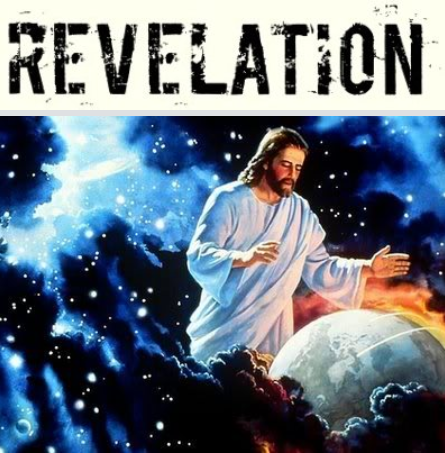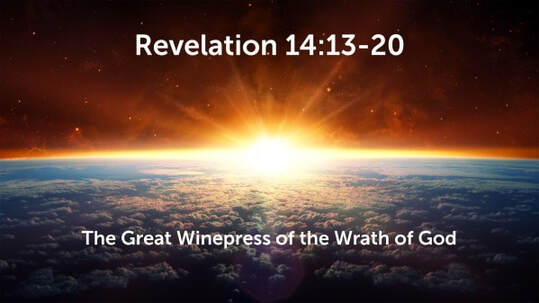The Revelation of Saint John the Divine
The King James Bible
|
Revelation 14:13-20 The harvest of the earth 13And I heard a voice from heaven saying unto me, Write, Blessed are the dead which die in the Lord from henceforth: Yea, saith the Spirit, that they may rest from their labours; and their works do follow them. 14And I looked, and behold a white cloud, and upon the cloud one sat like unto the Son of man, having on his head a golden crown, and in his hand a sharp sickle. 15And another angel came out of the temple, crying with a loud voice to him that sat on the cloud, Thrust in thy sickle, and reap: for the time is come for thee to reap; for the harvest of the earth is ripe. 16And he that sat on the cloud thrust in his sickle on the earth; and the earth was reaped. 17And another angel came out of the temple which is in heaven, he also having a sharp sickle. 18And another angel came out from the altar, which had power over fire; and cried with a loud cry to him that had the sharp sickle, saying, Thrust in thy sharp sickle, and gather the clusters of the vine of the earth; for her grapes are fully ripe. 19And the angel thrust in his sickle into the earth, and gathered the vine of the earth, and cast it into the great winepress of the wrath of God. 20And the winepress was trodden without the city, and blood came out of the winepress, even unto the horse bridles, by the space of a thousand and six hundred furlongs. |
Margin notes: "Blessed are the dead which die in the Lord from henceforth." (14:13) - "From now on, blessed are those who die believing in Jesus." This is the second of seven "beatitudes" found in Revelation. The other six are found in Revelation 1:3, 6:15, 19:9; 20:6, 22:7, and 22:14. "Upon the cloud one sat like unto the Son of man." (14:14) - The son of man sitting on a cloud is Jesus. Jesus on a cloud was prophesized in Daniel 7:13, six hundred years before John had his vision. "A gold crown on his head and a sharp sickle in his hand." (14:14) - The crown represents Jesus' authority and final victory. The sickle is a cutting tool used to chop down crops. Here, Jesus using the sickle means that He is our final judge. "The harvest of the earth is ripe." (14:15) - "The wicked of the world are ready." The world will be harvested, as predicted in Joel 3:13-14 2,800 years ago. The earth was reaped." (4:16) - Means judgment day has arrived. "He also having a sharp sickle." (14:17) - "He also had a sharp sickle." "Another angel... had power over fire." (4:18) - This angel can destroy with fire. "Thrust in thy sharp sickle." (14:18) - "Swing your sickle." The angel is calling for the harvesting of mankind. "The winepress was trodden without the city." (14:20) - "The grapes were crushed outside the city." Believers in God's city will be spared His punishment on the unrighteous. Additional note: A winepress is used to mash grapes. This euphemism for God's wrath was prophesized in Isaiah 63:3 over seven hundred years earlier. See "Today's Question" below. "Unto the horse bridles, by the space of a thousand and six hundred furlongs." (14:20) - The blood flowed as deep as a horse's bridle and for one hundred and eighty miles, the length of Palestine. Some scholars refuse to take this verse literally. They believe John is simply telling us that the final judgment will be widespread, involving everyone, everywhere. "A thousand and six hundred" (1600) is believed by some to represent complete and utter destruction. |
New Living Translation
Revelation 14:13-20
13 And I heard a voice from heaven saying, "Write this down: Blessed are those who die in the Lord from now on. Yes, says the Spirit, they are blessed indeed, for they will rest from their hard work; for their good deeds follow them!"
The Harvest of the Earth
14 Then I saw a white cloud, and seated on the cloud was someone like the Son of Man. He had a gold crown on his head and a sharp sickle in his hand.
15 Then another angel came from the Temple and shouted to the one sitting on the cloud, "Swing the sickle, for the time of harvest has come; the crop on earth is ripe."
16 So the one sitting on the cloud swung his sickle over the earth, and the whole earth was harvested.
17 After that, another angel came from the Temple in heaven, and he also had a sharp sickle.
18 Then another angel, who had power to destroy with fire, came from the altar. He shouted to the angel with the sharp sickle, "Swing your sickle now to gather the clusters of grapes from the vines of the earth, for they are ripe for judgment."
19 So the angel swung his sickle over the earth and loaded the grapes into the great winepress of God's wrath.
20 The grapes were trampled in the winepress outside the city, and blood flowed from the winepress in a stream about 180 miles long and as high as a horse's bridle.
This second Bible text from the "New Living Translation" (Tyndale House, Publishers, Wheaton, Illinois) is a paraphrase and not an accurate word-for-word translation of the Bible. However, it is a helpful tool when read with the "King James Version."
Today's question:
1. How does a winepress show God's wrath (14:19-20)?
Email us at [email protected] if you know anyone interested in receiving Free Bible lessons.
1. How does a winepress show God's wrath (14:19-20)?
Email us at [email protected] if you know anyone interested in receiving Free Bible lessons.
Answer: (Do you agree?)
1. "The treading of the grapes is a common Biblical metaphor to picture the execution of God's wrath upon his enemies."
"A winepress relentlessly crushes grapes; this symbolizes the relentless force of God's wrath on those who rebel against him."
(The "Quest Study Bible" published by The Zondervan Corporation, Grand Rapids, Michigan; pages 1789 and 1795)
Application thought for the day:
Read and ponder Jesus' explanation of "the harvest" in Matthew 13:37-43.
What does this teach us about God's wrath and how it applies to you?
1. "The treading of the grapes is a common Biblical metaphor to picture the execution of God's wrath upon his enemies."
"A winepress relentlessly crushes grapes; this symbolizes the relentless force of God's wrath on those who rebel against him."
(The "Quest Study Bible" published by The Zondervan Corporation, Grand Rapids, Michigan; pages 1789 and 1795)
Application thought for the day:
Read and ponder Jesus' explanation of "the harvest" in Matthew 13:37-43.
What does this teach us about God's wrath and how it applies to you?
Thanks to the writings and commentary of John Wesley and Adam Clarke. Also, "The Layman's Bible Study Notebook" by Irving Jensen published by Harvest House Publishing, Irvine, California; the "Life Change Series" published by NavPress books, Colorado Springs, Colorado; the "Life Application Study Bible" published by Tyndale House Publishing, Carol Stream, Illinois; the "Quest Study Bible" published by The Zondervan Corporation, Grand Rapids, Michigan; "Robertson's New Testament Word Studies;" "The MacArthur Bible Commentary" by John MacArthur published by Thomas Nelson, Nashville, Tennessee; "Wisdom of the Bible" CD by Topics Entertainment, Inc., Renton, Washington for their inspiring pictures; "My utmost for His Highest" by Oswald Chambers, published by Barbour Publishing, Inc., Uhrichsville, Ohio; The "Treasury of Scriptural Knowledge" by Reuben Archer Torrey; "Hope For Each Day" by Billy Graham published by J. Countryman, a division of Thomas Nelson, Inc., Nashville, Tennessee; "Easton's Bible Dictionary" by Matthew George Easton; "Unger's Bible Dictionary" by Merrill F. Unger, published by Moody Press, Chicago, Illinois; "Halley's Bible Handbook" by Henry H. Halley, Zondervan Publishing House, Grand Rapids, Michigan; "The Everyday Bible" published by World Wide Publications, Minneapolis, Minnesota; "The Living New Testament" published by Tyndale house, Wheaten, Illinois; "The New Living Translation" published by Tyndale House, Wheaten, Illinois; "The New Testament" translated from the Latin Vulgate, published by Guild Press, New York, New York; BibleGateway.com for all their wonderful links; and of course, the "King James Bible." All were critical in putting these lessons together.
© 2024 evolke
© 2024 evolke











